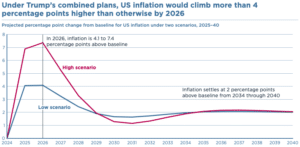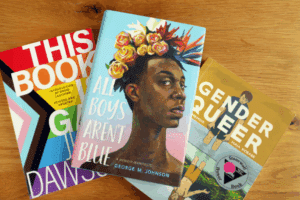 Book banning—along with other ways of restricting public access to written expression—has been a common and controversial issue throughout the history of the United States. For example, Harper Lee’s novel, “To Kill A Mockingbird,” has been repeatedly banned in schools and public libraries across the country since it was published in 1960. Challenges to the book frequently cite racist or sexual subject matter as harmful to readers, especially children.1 However, the ways books are challenged and banned has started to change rapidly, becoming a national controversial issue in the last few years.
Book banning—along with other ways of restricting public access to written expression—has been a common and controversial issue throughout the history of the United States. For example, Harper Lee’s novel, “To Kill A Mockingbird,” has been repeatedly banned in schools and public libraries across the country since it was published in 1960. Challenges to the book frequently cite racist or sexual subject matter as harmful to readers, especially children.1 However, the ways books are challenged and banned has started to change rapidly, becoming a national controversial issue in the last few years.
Until recently, challenges to books in schools and libraries were almost always from community members. They might object to a popular series, a specific author, or school or library lessons that include controversial titles. However, many of the bans in the last three years are linked to outside political organizations. At the same time, the number of books banned from public access has grown substantially. PEN America, a nonprofit that works to protect and expand access to written expression, reported a 33 percent increase in books banned in the 2022-2023 school year compared to the year prior.2 And last year, the American Library Association (ALA) found that nearly 2,500 books were challenged in libraries across the United States.3
Although such a large increase in book bans has concerned opponents of the restrictions, the content of the books being banned has become the bigger controversy. Many new bans promoted by political organizations target books containing a specific topic. In 2023, the ALA reported that almost 50 percent of titles challenged that year either included topics about people of color and/or LGBTQ+ individuals or were authored by individuals with those identities.4 Rep. Ayanna Pressley (D-Mass.) has been a particularly vocal critic of these types of bans. In December 2023, she introduced the Books Save Lives Act. Her bill sought to “push back on this dangerous trend” and “reaffirm the need for representative literature.”5
Supporters of these expanded book bans seek to restrict access to titles they find offensive, immoral, or age-inappropriate. Many supporters are parents or groups that believe parents have the right to control the content their children consume. One of the leading organizations supporting this position is Moms for Liberty, a social welfare and lobbying nonprofit with hundreds of chapters nationwide. Moms for Liberty and similar groups emphasize that certain topics like sexuality, racism, and violence should be removed from some public spaces so parents can better control when and how their kids learn about those issues. Moms for Liberty also supports candidates running for school board positions that control the books most available to children.6 Additionally, many parental rights groups create resources that are shared online to other supporters. For example, volunteers maintain the website Book Look, which features reviews of controversial books. Each review rates a book from zero to five based on its content, includes objectionable quotes from the text, and features a “profanity count” totaling the number of offensive words.7 In a review of “The Hate U Give,” for example, there is a warning of “excessive profanity, racism and racist commentary, and inexplicit sexual activities.”8
Those who oppose recent book bans argue that children benefit from exposure to writings that include diversity in characters, stories, cultures, and viewpoints. Some supporters of the Books Save Lives Act note how books have transformed their own lives. Author Maia Kobabe and co-founder of the Florida Freedom to Read Project Stephana Ferrell emphasized the importance of American children seeing themselves represented in literature. And during her floor speech announcing the bill, Rep. Pressley revealed that, after being sexually abused as a child, reading “I Know Why The Caged Bird Sings” by Maya Angelou helped her “move forward.”9 She said the representation of sexual abuse in the book made her feel less alone. Yet this novel has been challenged, banned, and restricted multiple times; in April 2025, it was banned from the library of the United States Naval Academy.10
Generally, both sides of the debate agree that literature is a form of media that can be very transformational and that children and teens can be impressionable. It is important to examine what content is accessible to our children; this fact is not disputed by supporters or opponents of book bans. Instead, those divided on this issue are trying to balance the security that young people need as they learn about difficult or more mature parts of life and the freedom to access ideas without government interference.
Discussion Questions
- Do you know of any efforts to ban books at your school or local library?
- How might book bans affect a child’s educational goals?
- What actions, if any, should the government take regarding this issue?
- Should laws require that some categories of books are accessible or inaccessible to children and teens?
- Who should have the final say in what books children read?
Related Posts
As always, we encourage you to join the discussion with your comments or questions below.
Close Up is proud to be the nation’s leading nonprofit civic education organization, working with schools and districts across the country since 1971. If you would like to partner with us or learn more about our experiential learning programs, professional development, or curriculum design and consulting, contact us today!
Sources
Featured Image Credit: Carolyn Cole / Los Angeles Times
[1] PBS: https://www.pbs.org/newshour/education/to-kill-a-mockingbird-remains-among-top-banned-classical-novels
[2] PEN America: https://pen.org/book-bans/2023-banned-book-list/
[3] American Library Association: https://www.ala.org/bbooks/book-ban-data
[4] Ibid.
[5] Office of Rep. Ayanna Pressley: https://pressley.house.gov/2023/12/14/pressley-unveils-bill-to-confront-rise-in-book-bans-ensure-inclusive-learning-environments/
[6] Moms for Liberty: https://www.momsforliberty.org/about/
[7] Book Look: https://www.booklook.info/public-book-reports
[8] Ibid.
[9] Rep. Ayanna Pressley: https://youtu.be/kC0dNMGeHBM?si=VHUKeVD0Myiiu3Y7
[10] New York Times: https://www.nytimes.com/2025/04/11/us/politics/naval-academy-banned-books.html
 In May 2024, Lai Ching-te was sworn in as the new president of Taiwan. Central to his campaign was rejecting any political claims to the island by mainland China (officially the People’s Republic of China or PRC) and establishing a fully independent Taiwan.1 This position is in clear opposition to the PRC’s “One China” principle, which views Taiwan as a breakaway Chinese province to be brought back under control. In response, Chinese authorities declared Taiwan’s new president responsible for increasing tensions between the two governments, which have been engaged in a power struggle for nearly 100 years.2 As tensions continue to rise, what actions, if any, should the United States take to protect Taiwan from Chinese control?
In May 2024, Lai Ching-te was sworn in as the new president of Taiwan. Central to his campaign was rejecting any political claims to the island by mainland China (officially the People’s Republic of China or PRC) and establishing a fully independent Taiwan.1 This position is in clear opposition to the PRC’s “One China” principle, which views Taiwan as a breakaway Chinese province to be brought back under control. In response, Chinese authorities declared Taiwan’s new president responsible for increasing tensions between the two governments, which have been engaged in a power struggle for nearly 100 years.2 As tensions continue to rise, what actions, if any, should the United States take to protect Taiwan from Chinese control?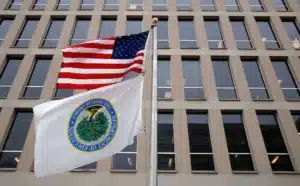 On March 3, the Senate confirmed Linda McMahon as the thirteenth secretary of education.1 Secretary McMahon has pledged to dismantle the Department of Education in what she calls its “final mission,” and on March 11, the Department announced it was cutting nearly 50 percent of its workforce.2 President Donald Trump is expected to sign an executive order directing Secretary McMahon to “take all necessary steps to facilitate the closure of the Education Department,” though the Department cannot be abolished unilaterally by the executive branch; this would require an act of Congress.3
On March 3, the Senate confirmed Linda McMahon as the thirteenth secretary of education.1 Secretary McMahon has pledged to dismantle the Department of Education in what she calls its “final mission,” and on March 11, the Department announced it was cutting nearly 50 percent of its workforce.2 President Donald Trump is expected to sign an executive order directing Secretary McMahon to “take all necessary steps to facilitate the closure of the Education Department,” though the Department cannot be abolished unilaterally by the executive branch; this would require an act of Congress.3 On February 25, President Donald Trump announced that new tariffs on goods from Canada and Mexico would go into effect on March 4.1 President Trump revived the use of tariffs in 2018, ending seven decades of emphasis on free trade economic policies. Since 2018, both Presidents Trump and Joe Biden have enacted several major tariffs, significantly impacting worldwide trade.2
On February 25, President Donald Trump announced that new tariffs on goods from Canada and Mexico would go into effect on March 4.1 President Trump revived the use of tariffs in 2018, ending seven decades of emphasis on free trade economic policies. Since 2018, both Presidents Trump and Joe Biden have enacted several major tariffs, significantly impacting worldwide trade.2
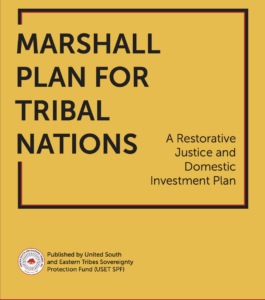 A Marshall Plan for Tribal Nations has gained support as tribal leaders and advocates call on the United States to fulfill its longstanding trust and treaty obligations.3 The phrase invokes the European Recovery Program—commonly known as the Marshall Plan—which the United States implemented after World War II to rebuild war-torn Europe. Today, Indigenous leaders are advocating for a similarly ambitious investment to repair the harm caused by centuries of policies that have left tribal nations underfunded and deprioritized.3
A Marshall Plan for Tribal Nations has gained support as tribal leaders and advocates call on the United States to fulfill its longstanding trust and treaty obligations.3 The phrase invokes the European Recovery Program—commonly known as the Marshall Plan—which the United States implemented after World War II to rebuild war-torn Europe. Today, Indigenous leaders are advocating for a similarly ambitious investment to repair the harm caused by centuries of policies that have left tribal nations underfunded and deprioritized.3 On January 20, his first day back in office, President Donald Trump issued an executive order that stops new offshore wind projects from obtaining lease permits, halting development meant to power over 12 million homes.1 At a rally later that day, President Trump characterized wind turbines as ugly and harmful to property values and to the environment.2
On January 20, his first day back in office, President Donald Trump issued an executive order that stops new offshore wind projects from obtaining lease permits, halting development meant to power over 12 million homes.1 At a rally later that day, President Trump characterized wind turbines as ugly and harmful to property values and to the environment.2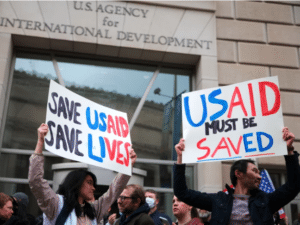 On his first day back in office, President Donald Trump signed an executive order that implemented a 90-day freeze on aid to other countries. Since then, the offices of the U.S. Agency for International Development (USAID) have closed, staff have been furloughed, and there have been more funding freezes. The formerly semi-autonomous agency is now under the leadership of Secretary of State Marco Rubio. Tech billionaire Elon Musk, who leads the new advisory body called the Department of Government Efficiency (DOGE), has targeted USAID and foreign aid when advocating for cutting the federal budget.
On his first day back in office, President Donald Trump signed an executive order that implemented a 90-day freeze on aid to other countries. Since then, the offices of the U.S. Agency for International Development (USAID) have closed, staff have been furloughed, and there have been more funding freezes. The formerly semi-autonomous agency is now under the leadership of Secretary of State Marco Rubio. Tech billionaire Elon Musk, who leads the new advisory body called the Department of Government Efficiency (DOGE), has targeted USAID and foreign aid when advocating for cutting the federal budget. During his first administration, President Donald Trump made tariffs and trade a major part of his economic policy. As he campaigned for another term, he further emphasized how he would use tariffs and trade if reelected. His strategy of issuing tariffs would be used to create more manufacturing jobs for Americans, shrink both the federal deficit and the U.S. trade deficit, and lower food prices.1 During the campaign, then-Vice President Kamala Harris pushed back, saying that Trump’s strategy would have a negative impact on families and their income. She saw, for example, a 20 percent universal tariff by a Trump administration costing families nearly $4,000 per year.2 This debate came at a time when inflation and the cost of consumer goods were among the top issues on voters’ minds.
During his first administration, President Donald Trump made tariffs and trade a major part of his economic policy. As he campaigned for another term, he further emphasized how he would use tariffs and trade if reelected. His strategy of issuing tariffs would be used to create more manufacturing jobs for Americans, shrink both the federal deficit and the U.S. trade deficit, and lower food prices.1 During the campaign, then-Vice President Kamala Harris pushed back, saying that Trump’s strategy would have a negative impact on families and their income. She saw, for example, a 20 percent universal tariff by a Trump administration costing families nearly $4,000 per year.2 This debate came at a time when inflation and the cost of consumer goods were among the top issues on voters’ minds.